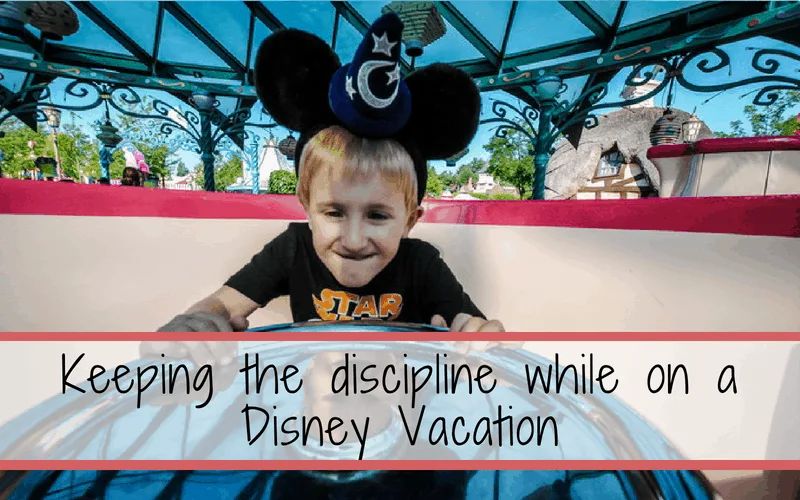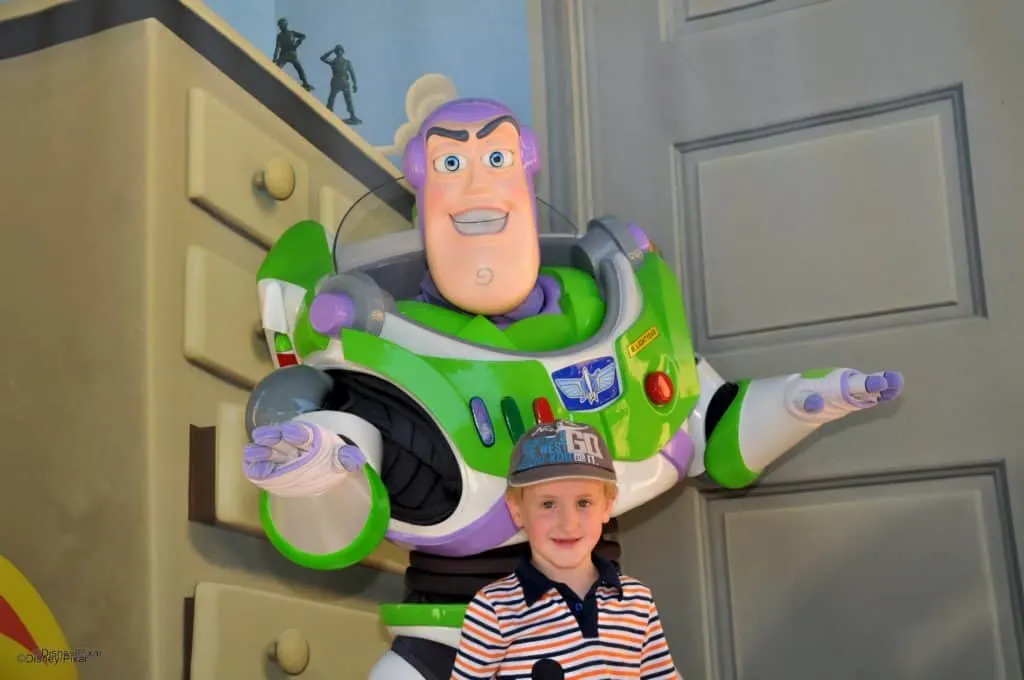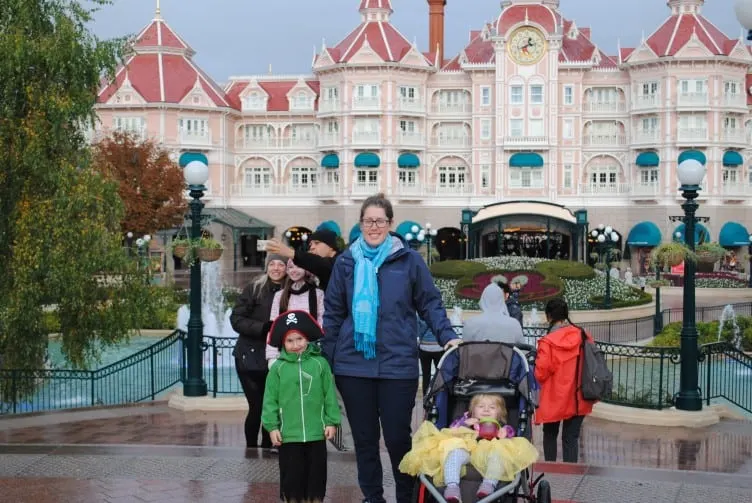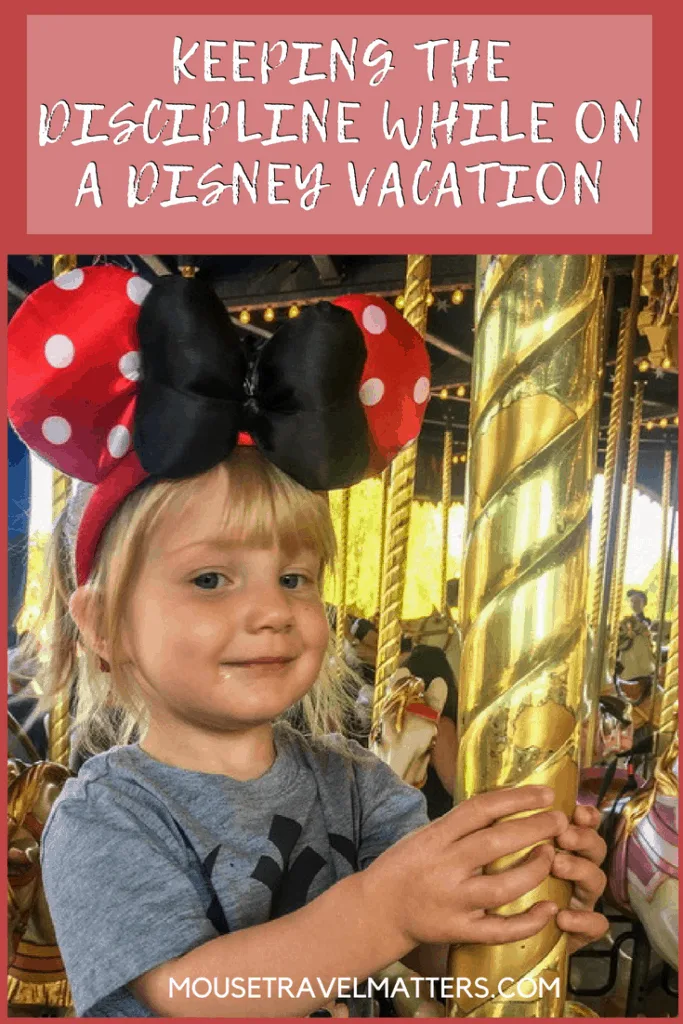
It seems like every time we talk to family and friends about our many travels, to Disney, with the kids, the first question we usually get is “Why?”, closely followed by “What will you do if they act up?”. This includes travelling the world as a whole as well. Parenting doesn’t change just because there is an ever-changing “prettier backdrop (not disney)“.
To which I earn a small commission, at zero cost to you!
Find more info in our Privacy Policy.
Maintaining control and providing for learning opportunities while on a Disney vacation is not easy. This can add a lot of fresh grey hairs and can lead to the development of bad habits at the end of your vacation.
With the heat, the crowds, sleep-inducing overstimulation, and the sheer lack of sitting (Oh the Lines! Survive with FastPass+), this uphill battle to keep the peace can be tedious but not impossible.
You and your children will grow and benefit from this experience, and the issues mentioned above are certainly something that is worth overcoming, especially for a well planned, but relaxed Disney holiday. After all, for Disney fans, Mouse Travel Matters.
This article will cover behaviour & discipline with kids at Disney & theme parks. We hope these strategies will help with all your plans, because who wants to reinvent the wheel for every trip.
Providing your kids with clear expectations and ramifications for poor behaviour can make all your trips feel a little more magical and a lot less stressful for the whole Disney loving family.
Provide Clear Expectations
Your Disney expectations should be the same as at home. Having different expectations can lead to confusion resulting in poor behaviour that takes away from the magic and fun of Disney & theme parks.
While overstimulated toddlers can be remedied on the go, an unhappy 6-year-old can stop a family dead in their tracks. A 6-year-old is capable of understanding expectations and consequences to the point where “they are just kids” isn’t going to fly in every scenario.
Behaviour & discipline with kids at Disney & theme parks isn’t exactly child’s play. It takes a lot of work, both from parents and the children, and a whole lot of self-discipline. These are our key concepts to follow, at home and on vacation, to successfully respond to and avoid behavioural problems.
So what rules should you establish with your kids? First, before you start listing every possible “Do this” and “Don’t do that,” keep in mind the number one rule about rules: They must be simple.
To make your rules simple, it’s important that your kids have only a few. If you give a long list of rules and procedures, it’s less likely they will follow them. “Because I said so…” has lead to many arguments and time-consuming punishments. Not something that is going to be effective when you are heading to the parks every day.
This likely means that your rules will be broad in scope, balancing that line between being specific enough to be black-and-white, while broad enough to be applied to multiple circumstances.
It’s difficult to enforce expectations that aren’t pre-established; it’s also hard to enforce expectations that are gray and non-specific.
The long lines at Disney & theme parks will be that much more bearable when clear expectations are in place.
Calm down before you fall down!
Family saying
The Consequences of Non-Compliance
If you can’t do X, the consequences are Y.
Whatever the consequences are, parents must remember that consequences are used as teaching tools. Consequences are not just punishments, but they exist to tangibly reinforce the positive expectations we desire. That’s why more than anything else, communication leading up to and following the delivery of a consequence is essential.
Examples of consequences are; You Break It, You Fix It; Loss of Privileges; Take a Break.

Warn your Kids
Depending on the severity of the infraction, a 1-2-3 warning system may work. “Stop pulling on the rope, this is your 3rd warning. Next time you stand over here and hold my hand.” Multiple warnings or nagging, on the other hand, undermine your credibility.
Jumping to consequences for minor infractions tend to devalue the severity of major infractions. Kids screw up, it’s kind of their shtick. It’s a balancing act, and only you know how many is enough for your child’s temperament and ability to understand expectations.
Follow Through
Once you have exhausted your warnings, it is important to follow through with whatever consequence you have laid out. This is also why it is important to be calm while laying out the rules; you don’t want to forced to do something you don’t want to do just because you said it in the heat of the moment.
How many times have you passed a parent making a threat that you have to wonder “Will they really do it? Will they really go home right now?”
Kids must understand that you are absolutely serious and committed.

Be Consistent
Playing with the ropes is never ok, we feel the biggest reason for this is the kids can get separated from parents and start pushing and shoving. Hitting your brother/sister is never ok, even when they “deserve it”. Inconsistency makes discipline a random event, causing random behaviour.
If you see your child doing something that they shouldn’t, it is important to deal with it right away. Pulling at the rope may seem fine in one situation, but it won’t be later on in a different situation and this becomes an inconsistent expectation; they will struggle to understand why it was ok before and not now, leading to conflict.
Don’t Give Unwanted Attention
Whining, tantrums, defiance and sibling friction are all ways they use to communicate. Be attentive to their words, and the context in which they use them. Along the same lines, try to find out the source of the behaviour issues. The root cause may not be what you think it is. Is your child acting out because of heat or fatigue? What about an attraction that may be a little scary in their mind’s eye? Are they thirsty or hungry? Sometimes children don’t know what they want or need until the parents ask.

The following are the key things to keep in mind.
Techniques to try when your kids blow up while waiting in line are also included.
Be the Adult. Disney Grown-ups!
Disney is for grown-up just as much as for the kids. Yelling and losing your cool with children over time can become normalized and children stop responding to it. This can make them less likely to behave.
Unless it’s super serious, there is very little reason to raise your voice or lash out. Be the adult, choose your words wisely and remain calm. Taking a deep breath.
Timeout / Freeze the Action
Stay calm. Pull the kids away from the behaviour causing event, such as the rope. No rope, no pulling on it while you are talking. If they are shouting at you while walking down Main St. USA, stop where you are (safely). Moving to another location can be time-consuming and the moment is lost.

Isolate
Have one on one conversations with the offending child. This won’t make the child feel like the focus of the group and potentially embarrass them in front of their siblings or other family members.
Embarrassment is not an effective teaching tool, it only leads to resentment and fear.
Review the Situation
You’ve made expectations clear, stated consequences, and given a warning. Follow through. Threats, lecture and accusatory language don’t work.
Remind them of what it is that they have done wrong; without it, they are grasping at straws and coming to their own conclusions about what they have done to deserve this; “Am I in trouble for throwing food last week at dinner? No, you are in trouble for fighting just now.” Also, remind them why their behaviour is unacceptable.
Perhaps they didn’t get the message in the pre-park breakdown, or during the warning stage of discipline, but now that you have their undivided attention, they may be more receptive to getting their privileges back and not repeating the offence.

Frequent Tantrums
If the child has frequent tantrums, and you have already addressed all of their needs, are sure they aren’t just tired or overstimulated, they probably just want attention.
This is perfectly normal, you are busy planning and pointing things out, are in the moment and your little one isn’t getting 100% of your attention like they are used to.
In their minds, negative attention is still attention and they are willing to do whatever it takes to get you for themselves. Avoid interacting with them when they are behaving poorly.
We have worded it this way many times “I’m sorry, I can’t understand you when you are crying and screaming at me.” If they have something to say to me, this usually stops the poor behaviour and they calm down in order to get their words out.
Reward positive behaviour. Praise them for calming down, and engage with them once they have displayed a willingness to communicate.
It is also noteworthy to praise them when they are displaying proper behaviour; after a long wait in line, it is important to acknowledge good behaviour. Not only are you acknowledging their hard work of being good, but also giving them positive attention without them using negative behaviour to get it.
It is important not to overpraise as it can become expected. We don’t believe instant gratification is a very good idea. Random praising shows them that we expect proper behaviour and therefore aren’t going to praise them for doing what is expected of them, however, we do acknowledge their efforts.
Salvage Operations
Grounded for life? It doesn’t happen often but once in a while, you get a great kid that does a whopper of a horrible thing and it warrants complete and total isolation from the vacation.
Instead of packing it in, heading home early and literally flushing your money down the toilet, there are ways to remedy the situation, salvage the remainder of the vacation and still give the offending child the discipline and consequences they need.
There are two ways to salvage this vacation, and protect your parenting responsibilities; hire an In-room babysitter, or rotate who stays with the offending child.
It’s Complicated.
We have found these strategies have worked very well for us. They are so many methods and opinions on this subject we hope that you found our insights helpful.
Your Thoughts...
Please share your thoughts in the comments or reach out on social media...We would love to hear from you.
Follow Mouse Travel Matters for Disney Parks news, the latest info and park insights, follow MTM on Twitter, Facebook, and Instagram.
You May Also Like…
What Can a 6-Month-Old Ride at Disney World?
Five Great Things to Do With Your Kids at the Epcot Food and Wine Festival
What are the height requirements for Disney World?
How to Stay Cool at Walt Disney World this Summer

